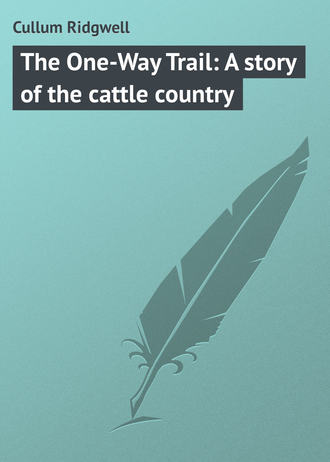 полная версия
полная версияThe One-Way Trail: A story of the cattle country
“Well?” he demanded, as Eve waited for him to speak.
“You are such friends, dear, that I wanted to ask you–Do you know why he came to see me?”
Will shook his head. Then a smile struggled round his clean shaven mouth.
“Maybe the same reason that makes most fellows crowd round a pretty girl.”
It was a wistful smile that accompanied the girl’s denial.
“I would like to think it was only that,” she said. “Do you know I am very, very fond of Jim. No, no, not in the way you mean,” she exclaimed hastily, as the man turned on her, hot with the jealousy which was so much a part of his Celtic nature. “I have always been fond of Jim. He’s so generous; so kind and self-sacrificing. Do you know, Will, I believe he’d give up anything to you. It is my conviction that his first thought in life is for your welfare and happiness. And somehow, it–it doesn’t seem right. No, I don’t mean that you don’t deserve it, but that–well, don’t you think a man should fight every battle in which he finds himself on his own account? Don’t you think, you who are so capable, that the struggles that every man must encounter in life demand the whole of his energies to bring them to a successful end? I do. It’s not a matter of self exactly, but we are all so full of weaknesses that this unselfish way of dividing our energies is apt to weaken our own defenses. Thus the scheme for our own uplifting, our own purification, rather suffers. You see, I think we are here on this earth for the purpose of bettering ourselves and preparing for that future, which–I know what I am saying sounds selfish, but really, really, I don’t think it is. Do you know, Jim came to ask me to marry him? I know he did. I avoided his direct question, and told him that you asked me last night, and that I had given you my promise. Well, he accepted it as though, as though he had no business to want what you wanted. And his only comment was that you were a ‘good boy,’ and that he thought you’d make me a good husband. Now, don’t laugh”–the man showed not the slightest inclination to do so. His face was livid; there was something like horror in his eyes–“but if I’d been a man in his place I should have been just mad. Do you think I’d have said that? No, Will; my thoughts would have been murderous. But with him it was otherwise, I’m sure. Yet he loved me, and he was hurt. I could see it–oh, I could see it. The agony in his eyes nearly broke my heart. Will, I think we owe Jim something. I know we can’t ever repay it. But we owe him surely. You do, even more than I. I can’t bear to think of his hurt.”
The girl ceased speaking. Will had made no attempt to stop her, yet every word she had spoken lashed him to a savage self-defense.
“I–I didn’t know he loved you,” he lied. Then he stopped with a sickening impulse. But in a moment he went on. He had taken the plunge, and his selfish nature came to his aid. “Poor Jim,” he said, with apparent feeling. “It’s hard luck–mighty hard luck. But, then, Eve, a feller can’t expect a man to stand by where a woman’s concerned. Not even a brother. You see, dear, I love you so bad. I’d lose anything but you, yes, even my life.” He drew nearer to her, but the girl made no response. “Jim’s got to take his ‘medicine.’ Same as I’d have taken mine, if you’d loved him. If Jim squeals, he’s not–”
“Oh, don’t be afraid of that,” Eve exclaimed, with some warmth. “Jim won’t ‘squeal.’ It’s not in him to ‘squeal.’ He’ll take his ‘medicine’ with any man. I’m not thinking of that. It’s–oh, I don’t know–only I think you’re lucky to have such a friend, and I–oh, I wish we could do something for him.”
Eve did not know how to express all she felt, and Will did not help her. He displayed no sympathy, but seemed absolutely indifferent, and she almost felt angry with him.
“There’s nothing to be done.” Then something prompted the man, and he went on harshly. “It was a fair fight and no favor. I love you, Eve; God knows how I love you. And I wouldn’t give you up or lose you for fifty Jims. If Jim stood in the way between us I’d–I’d–push him out at–any cost.”
“Will!” There was horror in the girl’s exclamation. Then the woman in her rose at the contemplation of the man’s love and passion for her. How could it be otherwise? She came to him, and was hugged in arms that almost set her gasping.
“I love you, Eve. I love you! I love you!”
Their lips met, and the woman clung to him in the rush of her responsive passion.
“Oh, Will,” she cried at length. “It’s good to be loved as you love. It’s so good. Kiss me, dear, kiss me again. I am all yours.”
The man needed no bidding. He had wronged his friend; had lied, lied in the worst way a man can lie, to make sure of her. He appreciated the cost, and its value made those moments all the more precious.
But he had no real regret for the wrong he had committed. And this was an unerring index to his nature. He would stand at nothing where his own desires were at stake.
CHAPTER VII
THE CHICKEN-KILLING
An hour later Will left the house. He felt good. He felt that he wanted to shout aloud his good fortune. To a temperament like his there was only one outlet to such feelings. He would go down to the saloon and treat the boys. They should share in his good fortune–to the extent of drink. He cared nothing for them in reality. He cared nothing for anybody but himself. He wanted drink, and to treat the boys served as an excuse.
Since winning Eve he had debated with himself the matter of “straightening up” with regard to drink. It is the usual condition of mind upon such occasions amongst men who live hard. It is an upward moral tendency for the moment, and often the highest inclination of their life’s moral switchback, the one that inevitably precedes the longest and severest drop. At no other time would he have needed an excuse to drink.
He hurried so as not to lose anything of the evening’s entertainment at the saloon, but his way did not take him direct. He had left the bulk of his money secreted in the cupboard in his old hut, a place he still kept in which to sleep when business or pleasure brought him in from the hunting-grounds of the trade which was his.
But the deviation was considerable, nor had he the assistance of any outside influence to keep his mind in focus. Thus he found it drifting whithersoever it chose. It passed from Eve to the saloon, to the money he required to help him pass the evening, to a dozen and one things, and finally settled itself upon the one subject he would rather have avoided. It focused itself upon Jim Thorpe, and, try as he would to break away from this thrall, it clung tenaciously.
He could not get away from Eve’s spoken sympathy for Jim, and every word he recollected stung him poisonously. His regard for Jim was of the frailest texture. He had always regarded him as something inevitable in his life, and that was all. Nor was he to be considered in the least where his own desires were concerned. Yet he cursed that shooting match. He cursed himself for going to see Jim at all. Why had he not gone to Eve in the first place? Then he promptly reassured himself that he had only gone to Jim out of a sense of honor. Yes, it was that shooting match. Jim had forced it on him. That was it. It was wholly Jim’s fault. How was he to know he was going to lose? There was no doubt that Jim was a fine shot, but so was he.
Then through his brain flashed another thought. Maybe it had inspiration in the thought of Jim’s shooting. What would happen when he met Jim, as, sooner or later, he knew he must? What would Jim’s attitude be? He frowned heavily. This had not occurred to him before. Would there be trouble? Well, if there were it might be easier, at least less complicated. On the other hand, what else could Jim do? It was uncomfortably puzzling. His own disposition made it impossible for him to probe the possibilities of such a nature as Jim’s.
He could not answer his question, and it left him with a feeling of apprehension which no prospect of violence could have inspired in him. He told himself he was sorry, regretted the whole occurrence, but there was less truth in his mental apology than in the feelings which his thoughts had inspired. Though in his heart he knew he had done wrong, he had acted with the grossest dishonor toward Jim, he would not admit it; consequently he experienced the nervous apprehension which every wrong-doer, however hardened, always feels at the thought of being confronted with his crime.
By the time he reached his hut he was in a bad mood. He not only rebelled against the worry of his thought, but wanted to vent his feelings. He probably hated Jim just then, and a meeting with him at that moment would undoubtedly have provoked a quarrel.
He was approaching his hut from the back. The place was in darkness, and he groped in his pockets for matches. He had to pass the old hen-roost, which, in their early days in Barnriff, had kept him and Jim supplied with fresh eggs. As he drew abreast of this he suddenly halted and stood listening. There was a commotion going on inside, and it startled him. He could hear the flapping of wings, the scuffling and clucking of the frightened hens.
For the moment he thought of the coyote, that thieving scavenger of the prairie which is ever on the prowl at night. But the next instant he remembered the chicken killing going on in the village. He ran to the door of the roost and flung it wide open. Without waiting for a light he stooped down and made his way in. And that act of stooping probably saved his life. Something whistled over his bent body, splitting the air like a well-swung sword. He knew instinctively it was a knife aimed at him. But the next moment he had grappled with his assailant, and held him fast in his two strong arms.
From that moment there was no further struggle. As he dragged his prisoner out he wondered. Then, in a moment, his wonder passed, as he felt a set of sharp, strong human teeth fasten themselves upon the flesh of his forearm. He dropped his hold and with his free hand seized his captive by the throat and choked him until the teeth released their grip.
To rush his prisoner along before him to the door of the hut and thrust him inside was curiously easy. There was no resistance or struggle for freedom. The captive seemed even anxious to avoid all further effort. Nor was there a word spoken until Will had struck a match and lit the guttered candle stuck in the neck of a whiskey bottle. Then, with the revealing light, he uttered an exclamation of blank astonishment.
Elia, Eve’s brother, stood cowering before him with his usually mild eyes filled with such a glare of abject terror that it might well have inspired pity in the hardest heart.
But Will was not given to pity. The boy’s terror meant nothing to him. All he remembered was his unutterable dislike of the boy, and his satisfaction at having caught the chicken-killer of Barnriff. And, to judge by the boy’s blood-stained hands, in the thick of his fell work.
“So, I’ve caught you, my lad, have I?” he said, with a cold grin of appreciation. “It’s you who spend your time killing the chickens? Well, you’re going to pay for it, you–you wretched deformity.”
The boy cowered back. His curious mind was filled with hatred, but his fear was all-mastering. Will suddenly reached forward and dragged him further into the feeble rays of the candle-light.
“Come here, you young demon!” he cried. “You’re not going to escape punishment because of your sister. You haven’t got her here to protect you. You’ve got a man to deal with. Do you understand, eh? A man.”
“A devil,” Elia muttered, his eyes gleaming.
“Well, at this moment, perhaps, a devil!” Will retorted, giving the boy’s arm a cruel twist. “How’s that?” he inquired, as the boy gave one of those curious cries of pain of his, which had so much likeness to an animal’s yelp.
“Oh, that’s nothing to what you’re going to get,” his persecutor went on. “We do the same here to boys who kill chickens as we do to those who kill and steal cattle. We hang ’em, Elia, we hang ’em. How would you like to be hanged?”
Will watched the working features. He saw and appreciated the terror he was causing, the suffering. But he could draw no further retort.
As a matter of fact he had no definite idea yet as to what he should do with his captive. He was Eve’s brother, but that did not influence him. He probably disliked the boy all the more for it, because one day he would be his brother, and he knew that Elia came before all else in the world in Eve’s thoughts. His jealousy and hatred were well blended, and, in a man of his mind, this was a dangerous combination.
He released his hold on his captive and looked at his bleeding arm. The boy’s teeth had left an ugly wound, and the blood was flowing freely. He turned his eyes again to Elia’s face and a devil lurked in them.
“I’ve a good mind to thrash you, you piece of deformity!” he cried angrily. And he made a move as though to fulfil his threat.
Then that cruel grin gathered round his lips again.
“That’s a good idea,” he said. “Thrash you for myself, and hand you over to those others, after.”
But his words had not the effect which his physical force had. Perhaps the boy, with that peculiar twist he possessed, was reading the indecision, the uncertainty in his captor’s mind. Anyway, the terror in his eyes was becoming less, and a defiant light was taking its place. But Will could see none of this, and he went on.
“I’d hate to be handed over to the boys for hanging–”
Elia suddenly shook his head.
“There’s no hangin’!” he cried, “and you know it. You send me to–the others an’ see what happens to you. I tell you, sis ’ud see you dead before she married you. Guess you best let me go right quick, an’ no more bulldozing.”
The boy had suddenly tacked to windward of him, and Will was confronted with an ugly “lee shore.” The trap he had fallen into was difficult, and he stood thinking. The dwarf had recovered himself, and his bland look of innocence returned to his eyes.
“I killed ’em nigh all–your chickens,” he said earnestly. “I’ll kill the rest later, because they’re yours. I can’t kill you because you are stronger than me, but I hate you. I’m goin’ right out of here now, an’ you won’t stop me.”
But the boy had overreached himself. Will was not easy when at bay.
He took a step forward and seized him by his two arms.
“You hate me, eh?” he said cruelly. “I can’t hand you over to the boys, eh?” He wrenched the arms with a twist at each question, and, at each twist, the boy uttered that weird cry that was scarcely human. “Well, if I can’t,” Will went on through his clenched teeth, wrenching his arms as he spoke, “it cuts both ways; you’ll get your med’cine here instead, and you daren’t speak of it–see, see, see!”
The boy’s cries were louder and more prolonged. Terror had again taken its place in his eyes. Yet he seemed to have no power for resistance. He was held in a paralysis of unutterable fear. With each of Will’s three final words the lad’s arms were nearly wrenched from their sockets, and, as the victim’s final cry broke louder than the rest, the door was flung open and the candle set flickering.
“Stop that!” cried a voice, directly behind Will, and the man turned to find the burly form of Peter Blunt filling the doorway.
But Will was beside himself with rage and hatred.
“Eh?” he demanded. “Who says to stop? He’s the chicken-killer. I got him red-handed.” He held up one of the boy’s blood-stained hands.
“I don’t care what he is. If you don’t loose him instantly I’ll throw you out of this shack.” The big man’s voice was calm, but his eyes were blazing.
Will released the boy, but only to turn fiercely upon the intruder.
“And who in thunder-are you to interfere?” he cried savagely.
Without a moment’s hesitation Peter walked straight up to him. For a second he stood towering over him, eye to eye. Then he turned his back, and thrust out one great arm horizontally across the other’s body, as though to warn him back while he spoke to Elia. There was nothing blustering in his attitude, nothing even forceful. There was a simplicity, a directness that was strangely compelling. And Will found himself obeying the silent command in spite of his fury.
“Get out, laddie,” said Peter gently. “Get out, quick.”
And in those moments while Will watched his prey hobbling to freedom, he remembered Eve and what it would mean if the story of his doings reached her.
As the boy vanished through the doorway Peter turned.
“Thanks, Will,” he said, in his amiable way. “You’d far best let him go. When you hurt that boy you hurt Eve–ter’ble.”
Swift protest leaped to Will’s lips.
“But the chickens. He killed ’em. I caught him red-handed.”
“Just so, Will,” responded the big man easily. “He’ll answer for it–somewhere. There’s things we’ve been caught doing ‘red-handed’ by–some one. And we’ll answer for ’em sure–somewhere.”
CHAPTER VIII
THE “BOYS” OF THE VILLAGE
The saloon was well filled, and it was evident from the atmosphere pervading the place that something unusually welcome was afoot.
As a rule evenings spent in the saloon at Barnriff were not gatherings one would readily describe as being “gay.” At least it would require a strong imagination to do so. A slight modification would be best. The Barnriff men were rarely lightsome, and when they disported themselves it was generally with a sombre sort of joy. That was their attitude just now. There was a peculiar earnestness about them, even in the fact of living. They seemed to be actuated by a deadly thoroughness which had a tendency to kill, not so much levity as lightness, and leave them mourning.
To-night such an atmosphere of sombre joy was prevailing. It was a similar attitude to that which they adopted on election day, Independence Day, at a funeral, or a wedding. It was the way anything out of the ordinary always affected them.
The fact of the matter was Doc Crombie, who was doctor, veterinary surgeon, horse dealer, and a sort of self-elected mayor of the place, was going to hold a meeting in the saloon. He was going to make a formal speech, and the speech was the point.
Now, if there was one thing Barnriff bowed the knee to it was the man who could, and would, make a speech. It had all the masses’ love for oratory, and was as easily swayed by it as a crowd of ignorant political voters. Besides, Doc Crombie was a tried orator in Barnriff. He had addressed a meeting once before, and, speaking on behalf of a church mission, and asking for support of the cause, he had created a great impression by his stern denunciation of the ungodly life in Barnriff, and his flowery laudation of those who allowed themselves to respond to the call of “religion.”
On that occasion he said with all the dignity and consequence of his position at the moment–
“It ain’t your dogone dollars we want. It’s your souls. D’you git that? An’ when we’ve sure got ’em wot’ll we do with ’em, you ast? Wal, I don’t guess we’re doin’ a cannibal line o’ business. Nor ain’t we goin’ to stuff ’em an’ set ’em up as objec’s o’ ridicool to the ungodly hogs wot wallers in the swill o’ no adulteratin’ son-of-a-moose of a dealer in liver pizen. No, gents, that ain’t us. We’re goin’ to save ’em. An’ I personal guarantees that savin’ racket goes. Did I hear any mangy son-of-a-coyote guess he didn’t believe no such guarantee? No, an’ I guess he best not. I’m a man of peace, as all knows in this yer city, but I’d hate to try an’ shut out a blizzard in winter by stuffin’ that gopher’s perforated carkis under the doorjamb when I was thro’ with it. I say right here we’re out to save carkises–I mean souls. An’, say, fellers, jest think. Gettin’ your souls saved for a few measly cents. Ain’t that elegant? No argyment, no kickin’. Them souls is jest goin’ to be dipped, an’ they’ll come up white an’ shinin’ out of the waters of righteousness a sight cleaner than you ever got your faces at Christmas, washin’ in Silas Rocket’s hoss trough, even when his hoss soap was plenty. Think of it, fellers, and I speak speshul to you whiskey souses wot ain’t breathed pure air sence you was let loose on the same gent’s bowel picklin’ sperrit. You’ll get right to Meetin’ on Sundays with your boots greased elegant, an’ your pants darned reg’lar by your wimmin-folk wot’s proud of yer, an’ don’t kick when you blow into a natty game o’ ‘draw.’ You’ll have your kids lookin’ up at your fancy iled locks, an’ your bow-tie, an’ in their little minds they’ll wonder an’ wonder how it come your mouths ain’t drippin’ t’baccer juice, an’ how they ain’t got cow-hided ’fore the breakfast they mostly have to guess at, an’ how it come you’re leadin’ them, ’stead o’ them leadin’ you, an’ how their little bellies is blown out with grub like a litter o’ prize hogs. Think of it, fellers, an’ pass up your measly cents. It ain’t the coin, it’s the sperrit we want, an’ when I think of all these yer blessin’s I’m personal guaranteein’ to the flower o’ Barnriff’s manhood I almost feel as though I wus goin’ to turn on the hose pipe like a spanked kid.”
He talked till he had half of Barnriff’s “flower” blubbering, and he had emptied the last cent out of their pockets, and the mission was set on a sound financial basis. But as to his guarantee–well, the doctor was well understood by his fellow citizens, and no one was ever heard to question its fulfilment.
It was wonderful what a power of persuasion he had in Barnriff. But then he was an awe-inspiring figure, with his large luminous eyes and eagle cast of feature. And, too, words flowed from his lips like words from the pen of a yellow journal reporter, and his phraseology was almost as picturesque.
The boys were gathered waiting for him. There was anticipatory pleasure in their hang-dog faces. One of them almost laughed at a light sally from the cheery Gay, but luckily it was nipped in time by the interposition of the mean-minded Smallbones.
“I sez it right here, boys,” the latter observed, leaning with his back against the bar, and speaking with the air of having just arrived at a grave decision. “Old Sally Morby hadn’t no right to burry her man in oak. Now I ast you, Gay, as man to man, if you’d know’d we was goin’ to be ast to ante up fer her grub stake, wot could you ha’ done him handsome an’ moderate fer?”
Gay squared his fat shoulders. For the moment he was important. Moments of importance are always precious, even in places like Barnriff.
“Wal, I can’t rightly give it you down to cents without considerin’ Restless some,” he replied unctuously. “But we did Toby Randall slap-up in ash fer fifty odd dollars. Then ther’ was Sadie O’Brien. We did her elegant in soft pine for twenty-eight odd. It ’ud sure have been twenty-five on’y fer her weight. Y’see the planks under her had to be two inch or she’d ha’ fell through.”
He produced his note-book and rapidly glanced over the greasy pages.
“Y’see,” he observed, pausing at the entry he had been looking for, “Sally paid us a hundred an’ forty-seven dollars an’ seventy-five cents. I ’lows that’s handsome fer buryin’ a hop-headed skite like Charlie Morby was. But that wus her order, an’ bein’ a business man, an’ takin’ pride in my work, I sez to Restless, I sez, ‘It’s oak, boy, oak with silver plate trimmin’s, an’ a real elegant inscription to Charlie on it, tellin’ folks o’ virtues he didn’t never handle when he was livin’.’ He sure didn’t deserve nothin’ better than an apple bar’l, leavin’ the head open so he had a chance to dodge the devil when he come along. An’ I guess, knowin’ Charlie, he’d ’a’ given him an elegant run fer it.”
“That’s it,” exclaimed Smallbones, peevishly. “That’s it. She goes an’ blows in her wad on a buzzock what ought to bin drownded in yaller mud, an’ we’ve got to ante her grub stake. Psha! I ain’t givin’ a cent.”
Lean Wilkes, the baker, was watching the trust schemer with baleful eye, and now his slow tongue evolved a pretty retort.
“No one sed you was–nor thought it likely.”
“The duff puncher wakin’ up,” sneered Smallbones, angrily.
“Guess it’s your voice hurtin’ my ear drums,” replied Jake, ponderously.
At that moment Abe Horsley joined the group. He called for drinks before adding his bit to the talk. He had an axe to grind and wanted a sympathetic audience. While Rocket, observing his customers with shrewd unfriendly eyes, set out the glasses and the accompanying bottles–he never needed to inquire what these men would take; he knew the tipple of every soul in Barnriff by heart–Abe opened out. He was unctuous and careful of his diction. He was Barnriff’s lay-preacher, and felt that this attitude was “up to him.”









